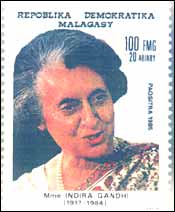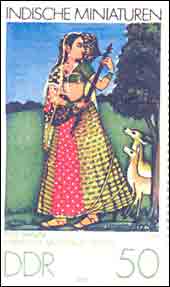Home > News > Report
Tiny pieces of history and culture
Ehtasham Khan in New Delhi |
January 12, 2004 18:33 IST
Stuck on the corner of letters, they have been telling the tales of India's achievements and contributions to the world.
Stamps have introduced Gandhi, Lord Ganesha and Ganga in millions of homes. They have, quite literally, documented India's history, economy and philosophy on tiny pieces of paper. They are symbols of India's recognition in foreign lands.
About 30 years ago, New Delhi-based philatelist Madhukar Jhingan thought of collecting postal stamps released by foreign countries on India. Now he has hundreds of them from dozens of countries.
 | Also Read |  | |
|
"I have not counted, but there are hundreds of them. The number is not so important. What makes the difference is the variety and peculiarity of the collection," Jhingan told rediff.com, standing in front of his collection of stamps stuck on laminated wooden frames.He exhibited his collection at the second Pravasi Bharatiya Divas at Vigyan Bhawan in Delhi. Minister of State for External Affairs Vinod Khanna inaugurated the exhibition.
"I have showcased a small section of my collection. This is to show India's achievements and contributions and how it has been recognised in the world," says Jhingan, who edits a weekly magazine Stamps Of India.
Several countries have released postal stamps and seals on India. This attracted Jhingan and he started collecting them.
Now he has stamps on festivals like Holi and Diwali, monuments like Taj Mahal and Red Fort, gods like Ganesha and Buddha, political figures like Mahatma Gandhi and Jawaharlal Nehru, sportsmen like Kapil Dev and Sunil Gavaskar, and much more.
These stamps have been released by dozens of countries that recognised India's strength in various fields.
"Buddha and Gandhi are two figures on whom hundreds of stamps have been released by several countries. These two people have been given respect by all," says Jhingan.
It was Gandhi that increased Jhingan's curiosity in collecting foreign stamps on India.
"In 1969, Gandhi's centenary was celebrated. It was around this time that many countries released stamps on Gandhi. It was here that I caught on with it," recalls Jhingan, who learned the art of philately from his grandfather.
 "My grandfather Pandit Chaman Lal Sharma was a college principal in Chandausi (in Uttar Pradesh). He had the hobby of collecting coins and stamps. He got mails from several countries. And I started collecting the stamps on these mails. I was five years old then," he says.
"My grandfather Pandit Chaman Lal Sharma was a college principal in Chandausi (in Uttar Pradesh). He had the hobby of collecting coins and stamps. He got mails from several countries. And I started collecting the stamps on these mails. I was five years old then," he says.
"But the idea of collecting foreign stamps on India picked up from Gandhi's centenary," he says. Since then Jhingan has won several national and international awards on philately.
"I have got hundreds of stamps on Gandhi. I can do a separate exhibition on Gandhi," he says.
His collection includes India's naval ships, paintings, railways, music, dance and ancient civilizations.
A Canadian postal stamp has word "peace" written on it in dozens of world languages, including Hindi and Gujarati. A postal seal of Luxembourg has Taj Mahal inscribed on it.
A stamp released in Afghanistan during the Taliban regime had Rahul Dravid playing cricket. Stamps on India-born US astronaut Kalpana Chawla, who died in the Columbia tragedy, have been released by dozens of, countries including lesser known Gambia and Palau. Many stamps have been released on Mother Teresa and Rabindranath Tagore also.
"The idea behind the exhibition was to give myself a good feeling and make others feel good. I feel great when people praise me. The delegates were astonished and even Vinod Khanna (the minister) was amazed," says Jhingan.
He says philately is a difficult and expensive art. "It needs lot of effort. I keep writing to people to send me stamps and even buy lots of them. Then preservation is another problem. I import the preservatives and lamination products from abroad," says Jhingan.
"Many people collect stamps but hardly one per cent of them preserve and exhibit their collections," he adds.